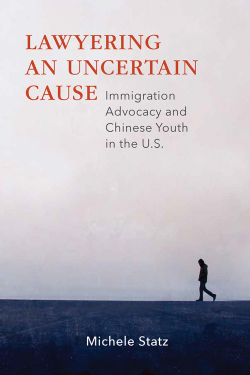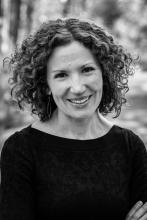Michele Statz, UW Anthropology PhD, 2014, is an anthropologist of law and Assistant Professor in the Department of Family Medicine and Biobehavioral Health at the University of Minnesota Medical School, Duluth campus. Her recently published book, Lawyering an Uncertain Cause: Immigration Advocacy and Chinese Youth in the US, is available from Vanderbilt University Press. Michele is also a principal investigator of an NSF Law and Social Sciences and Cultural Anthropology Program grant, “Northland Access to Justice: Legal Advocacy, Equity, and Mobilization Across Rural Minnesota and Wisconsin,” and continues to advocate and work with communities on issues of importance to them.
What brought you to anthropology?
I knew in high school that I wanted to be an anthropologist. My parents farmed when I was young (I’m a first-generation college graduate), and they made a point to take my sister and I to public museums and libraries as much as possible. In hindsight, it was a perfect balance — a lot of fresh air and a lot of exposure to life beyond a small, rural community in Wisconsin.
I lived and worked on the Tibetan plateau after graduating from college, and the experience left me unsettled in hard and important ways. I think the discomfort I felt was ultimately what motivated me to apply to graduate studies in anthropology. Midway through my program, what kept me in anthropology was Kate Dudley’s book, Debt and Dispossession: Farm Loss in America’s Heartland. It was the first time that I very personally felt the deep capacity of anthropology to explain experience in a sensitive, rigorous, and accessible way.
How would you describe your field of study/research to a friend who is not an anthropologist?
I recently learned that my research assistant’s mom thinks we’re doing some form of cryptozoology, so I suppose I would begin by underscoring that this has nothing to do with Sasquatch.
I have two ongoing research agendas. The first follows from my dissertation research, which documented the work of U.S. public interest immigration attorneys alongside the experiences of Chinese youth who migrate alone and clandestinely to the U.S. and are designated “Unaccompanied Minors.” This research is featured in my new book, Lawyering an Uncertain Cause: Immigration Advocacy and Chinese Youth in the U.S. (Nashville: Vanderbilt University Press, 2018), and it also informs my ongoing applied work. Since 2014, Lauren Heidbrink and I have co-curated and edited Youth Circulations, a website dedicated scholarship, art, and activism around global youth and the politics of representation. We have a wide, international audience of +12,000 and are committed to an anthropology that is truly public (and current).

I am also in the middle of a three-year, NSF-funded project on rural access to justice across northeastern Minnesota and northern Wisconsin. This research occurs amidst persistently high poverty rates in rural America and diminishing funding for civil legal aid providers. Despite recent policy and professional efforts to address barriers to rural access to justice, it is rare for initiatives to expressly consider the diverse concerns that rural low-income individuals themselves prioritize; whether rural legal professionals share and are equipped to address these issues; and the extent to which local interpretations of justice align with the assessments of “outside” policy makers. Through extensive, mixed-methods research across diverse county and tribal contexts, I hope this project can begin addressing these gaps.
What drew you to your topic?
I was drawn to my immigration research after listening to public interest immigration attorneys describe their professional work and personal motivations — and then realizing the extent to which attorneys’ interpretations of their clients’ needs and wishes did not, and in a sense could not, match the reflections young migrants themselves shared with me. This is a profoundly consequential disconnect, and one that opens into broader realities of legal practice, immigration policy, and racialized narratives of migrant youth and their families.
For that project, I did research in traditional gateway cities like New York and Chicago as well as “new destination” communities in the Midwest and South. And at some point I realized that it was really easy for me to talk with people in small towns. I also realized that in academia, where many of us arrive owing to considerable privilege and well-established structural hierarchies, it might actually be relatively rare to speak “small town.” While things changed a bit post-2016, rural northern communities still largely remain off anthropologists’ radars in the U.S. — despite being complicated and important socio-spatial and legal contexts. I wanted to change that.
How do you use your degree in your professional life?
I am currently an Assistant Professor at the University of Minnesota Medical School, Duluth. The mission of the Medical School is to improve healthcare access and outcomes in rural Minnesota and American Indian / Alaska Native communities, and by virtue of studying access to justice (which implicates access to healthcare, housing, education, and so on), my research maps onto and helps inform the school’s commitments.
What’s next?
I really love where I live and what I do, and I’d be thrilled to continue this research (in whatever direction it leads) for a long time. Working in a smaller community allows for rapport and publicity in ways that I hadn’t anticipated. It’s led to exciting opportunities to share what I’m learning with state and federal policy-makers, and to communicate regional social and structural determinants of health across local legal and medical communities. I’m not a member of either profession, but I’m hopeful that this research is relevant to both.
What advice would you give a student today about a career in anthropology?
I’m proud to be an anthropologist and am grateful for the ways I’ve come to see the world through the discipline. That written, I was also really invested in my identity as an anthropologist and as an academic when I graduated with my PhD — and the following two years I spent on the job market were fairly devastating. Despite technically knowing better, I did not want to admit the current state of the discipline or of higher education more generally. I was in a totally unsupported VAP at the time, and I had to really accept — and grieve — that trying to teach well and conduct research as contingent labor would take (and indeed, was taking) an enormous toll on my family and my well-being.
My spouse and I recalibrated, and I ended up getting a postdoc, and then an assistant professor position, at a medical school (as an anthropologist of law). I don’t think anything about my career path in anthropology is “typical” or representative, but a few thoughts from along the way:
- Attend professional conferences. It’s important to network but just as important to be compelled and challenged by others’ research and remember why you love the discipline.
- If the university offers seminars about “hitting the job market” or “successful networking strategies,” attend those things — even if you don’t think you like what networking means. Always take the opportunity to speak with recent grads who have left academia — or who have stayed — and who make themselves available to junior scholars. (That includes me.) The path that led me to a position in a med school was strange and circuitous, and it was entirely propelled by good people offering their insights and connections.
- As a graduate student in an R-1 institution, you are also responsible to share your insights and connections! You’re probably burned out and maybe a little insecure and uncertain about your future, but you will leave with a PhD and an elite status that not many people in the world have. You have power and you have to use it.
- To that end, and in closing: Publicize your research like crazy. It’s important to publish in the “traditional” sense, obviously, but just as important to put your work out there. Talk about your project on social media; utilize academic listservs; build a website; connect with relevant AAA interest groups; reach out to reporters on mainstream and alternative / independent media. As anthropology graduate students, you do important, interesting work. The public needs to hear about it.
